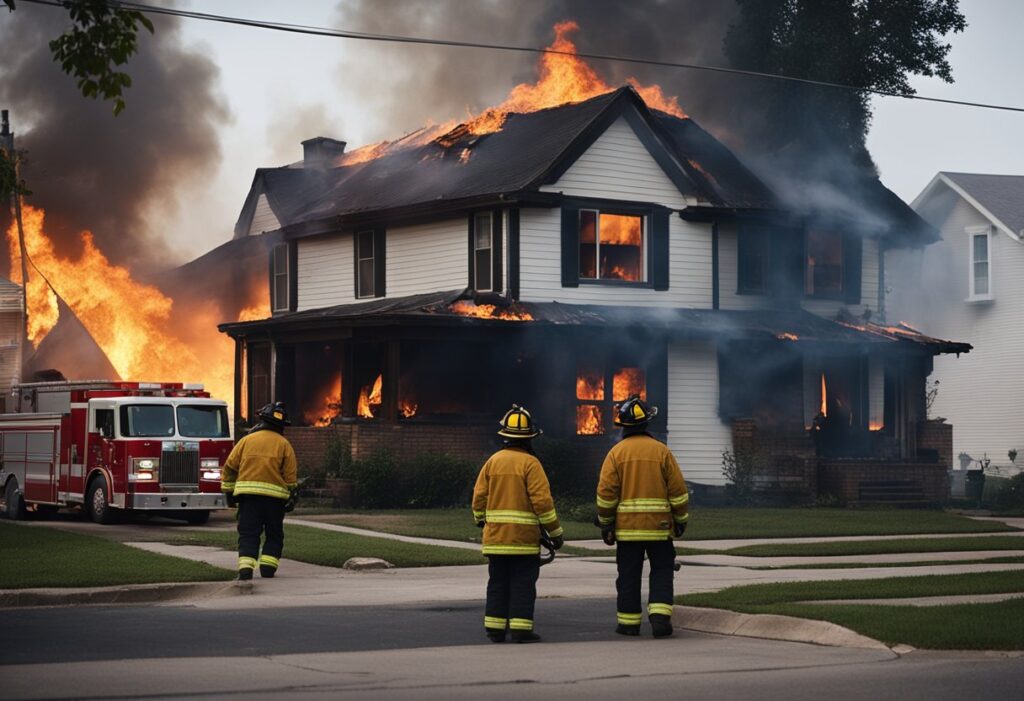Don’t Let Disaster Strike Your Dreams; Your Essential Guide to Home Insurance
Imagine waking up to a peaceful morning, only to find a gaping hole in your roof after a surprise storm.
The thought can send shivers down any homeowner’s spine. But fear not! Having the right home insurance Essentials in place can be the difference between financial ruin and a speedy recovery.
Key Takeaways:
- Home insurance is an investment that safeguards your most valuable asset and provides peace of mind.
- Whether you’re a proud homeowner or a renter, securing your space is crucial.
- By knowing different coverage options, cost factors, the claims process, and how to choose the right company, you can ensure your home is well-protected against unexpected events.

What is Home Insurance?
Home insurance is a safety net that protects your castle your most valuable asset. It provides financial coverage for your home’s structure, your belongings within it, and even protects you from liability if someone gets injured on your property.
Think of it as a superhero for your home, ready to spring into action when the unexpected happens.
Benefits of Home Insurance:
Let’s face it, life throws curveballs. Home insurance ensures you’re prepared for whatever comes your way:
Peace of Mind: Knowing you’re financially covered allows you to focus on what matters most – getting your life back on track after a disaster.
Financial Security: Home repairs and replacing belongings can be expensive. Insurance helps shoulder the burden, preventing a financial catastrophe.
Unexpected Events Covered: From fire and theft to storms and vandalism, home insurance offers protection against a wide range of issues.
Who Needs Home Insurance?
Whether you’re a proud homeowner or a renter, securing your space is crucial. Here’s why everyone needs home insurance:
Homeowners: Your home is likely your biggest investment. Protecting it with insurance is a no-brainer.
Renters: Even if you don’t own the building, your belongings inside it do hold value. Renters insurance safeguards your furniture, clothes, and other possessions. (Consider linking to a dedicated “Renters Insurance” blog post here)
This guide will delve into the world of home insurance, equipping you with the knowledge to make informed decisions and choose the perfect policy for your needs.
We’ll explore different types of coverage, cost factors, the claims process, and how to select the right insurance company.
Types of Home Insurance Coverage
lets look at some kinds of Home insurance coverage
Dwelling Coverage: The Fortress You Call Home
Dwelling coverage acts as the shield for your physical home. It typically covers:
- The structure of your house, including walls, roof, and foundation.
- Attached structures like garages or decks.
- There are two main coverage options:
- Actual Cash Value (ACV): This reimburses you for the depreciated value of your home at the time of a loss.
- Replacement Cost: This covers the cost of rebuilding your home to its pre-loss condition, even if it has increased in value.
The cost of dwelling coverage depends on several factors, including:
Square footage: Larger homes naturally cost more to rebuild.

Building materials: Sturdier materials like brick typically have lower premiums compared to wood-frame construction.
Location: Homes in high-risk areas prone to natural disasters will have higher premiums.
Personal Property Coverage: Protecting Your Treasures
Your home is filled with cherished belongings. Personal property coverage ensures they’re protected:
This covers your furniture, electronics, clothes, and other possessions within the home.
Coverage Limits: Set a limit that reflects the total value of your belongings. Don’t underestimate the worth of your possessions!
Deductibles: You choose a deductible amount – the portion you pay out of pocket before the insurance kicks in. A higher deductible lowers your premium.
Valuable Items: For high-value items like jewelry or artwork, consider adding floater coverage for additional protection.
Additional Coverages: Expanding Your Shield
While basic coverage is essential, consider these additional shields for ultimate protection:
Liability Coverage: This protects you if someone gets injured on your property and sues you.
Medical Payments: Covers medical expenses for guests who sustain minor injuries at your home.
Loss of Use: If your home becomes uninhabitable due to a covered event, this coverage helps with additional living expenses (e.g., hotel stays).
Flood Insurance: This is a separate policy often required in flood-prone areas.
Exclusions: Understanding What’s Not Covered
It’s crucial to understand what your home insurance policy excludes. Common exclusions include:
Floods (requires separate flood insurance)
Earthquakes (may require additional coverage)
Normal wear and tear
Intentional damage
Home Insurance Costs: Budgeting for Your Shield
The cost of home insurance varies depending on several factors:
Location (mentioned earlier): Areas with higher risk of natural disasters or crime will have higher premiums.
Dwelling value and coverage amount: The higher the value of your home and the chosen coverage (replacement cost vs. ACV), the higher the premium.
Age and condition of the home: Older homes or those in need of repairs may have higher premiums.
Deductible: Choosing a higher deductible lowers your premium but means you’ll pay more out of pocket before insurance kicks in.
Credit history: Having good credit can lead to discounts on your home insurance.
Claims history: Previous claims can increase your premiums, so filing claims wisely is important.

Ways to Save on Home Insurance:
Bundle home and auto insurance: Many companies offer discounts for bundling multiple policies.
Increase your deductible: As mentioned earlier, a higher deductible lowers your premium, but remember to strike a balance you’re comfortable with.
Improve your home’s security features: Installing security systems, smoke detectors, and deadbolts can lead to discounts.
Shop around and compare quotes: Don’t settle for the first quote you get. Get quotes from multiple companies to find the best coverage and price.
Consider discounts offered by your insurance company: Many companies offer discounts for things like loyalty, completing online safety courses, or having certain occupations.
Tips for Getting a Quote:
Have a complete inventory of your belongings: This helps determine the appropriate amount of personal property coverage.
Understand your dwelling’s replacement cost: Knowing this helps ensure you have adequate coverage for rebuilding your home.
Be prepared to answer questions about your home and claims history: The more information you provide, the more accurate your quote will be.
The Home Insurance Claim Process: Navigating the Aftermath
A covered event strikes – what now? Here’s how to navigate the claims process smoothly:
Filing a Claim: Promptly report the loss to your insurance company by phone or online. The sooner they know, the sooner they can help.
Documentation Required: Gather necessary documents like photos of the damage, police reports (if applicable), and receipts for repairs or replacements.
Claim Settlement Process: The insurance company will assess the damage and determine the payout based on your coverage and policy limits.
Tips for a Smooth Claim Process:
Document the damage thoroughly (photos, videos) for clear evidence.
Keep detailed receipts for repair or replacement costs to substantiate your claim.
Be prepared to answer questions from your insurance adjuster and provide additional information if needed.
Maintain open communication with your insurance company throughout the process.
Choosing the Right Home Insurance Company: Finding Your Champion
Selecting the right home insurance company is crucial. Here are key factors to consider:
Financial stability and reputation of the company: Look for a company with a strong track record of paying claims.
Coverage options and customer service reviews: Choose a company offering coverage that aligns with your needs and boasts positive customer service experiences.
Price competitiveness and available discounts: Compare quotes and discounts offered by different companies to find the best value.
Ease of filing claims and communication channels: Ensure the company has a user-friendly claims process and offers multiple communication channels (phone, online chat, etc.).
Whether the company specializes in your specific needs: Some companies cater to specific types of homes (e.g., older homes, high-value properties).
Obtain quotes from multiple reputable insurance companies. This allows for price and coverage comparison.
Don’t be afraid to ask questions and clarify any doubts you have about the policy details.
Don’t Just Focus on Price:
While cost is important, prioritize comprehensive coverage and a company known for excellent customer service. Remember, the cheapest option might not be the best in the long run if you face a claim and encounter difficulties.
Ready to secure your home with the right insurance? Don’t wait! Get free quotes from reputable insurance companies today and find the perfect policy for your needs.
Frequently Asked Questions on Home Insurance
How much does home insurance cost? this depends largely on your insurance company premium.
What is covered by home insurance?
Home insurance typically covers damage caused by various events, including: Fire and lightning, Theft and vandalism, Wind and hail, Explosions, Riots, Aircraft, Smoke damage, Falling objects, Weight of ice and snow
Is flood insurance included in home insurance?
No, flood insurance is a separate policy often required in flood-prone areas.
What are the different types of home insurance?
There are various homeowners insurance policies, but the most common are:
HO-1 (Basic Coverage): Covers named perils (events specifically listed in the policy).
HO-2 (Broad Coverage): Covers all perils except those explicitly excluded.
HO-3 (Dwelling Coverage): This is the most common type, covering the structure of your home and some attached structures.
HO-4 (Renters Insurance): Protects a renter’s belongings and liability within a rented dwelling.
HO-5 (Comprehensive Coverage): Offers the most extensive coverage, similar to HO-2 but often with higher limits and additional coverages.

Do I need home insurance if I own my condo?
Yes, even condo owners need insurance. While the building’s exterior might be covered by a master policy, your personal belongings and interior improvements likely require separate condo insurance.
How can I file a home insurance claim?
As mentioned earlier, promptly contact your insurance company by phone or online to report a covered loss. They will guide you through the claims process, which typically involves:
Filing a claim form
Submitting documentation (photos, receipts)
Cooperating with an adjuster who assesses the damage
What should I avoid doing after a home insurance claim?
Don’t throw away damaged items without your insurance company’s approval. They might need to inspect the damage.
Don’t make permanent repairs before the insurance company inspects the damage and approves the repairs.
Don’t discuss the claim with anyone other than your insurance company or authorized representative.
By understanding these frequently asked questions, you’ll be well-equipped to navigate the world of home insurance and make informed decisions to protect your home.
Conclusion
Home insurance is an essential shield for your home, offering financial security and peace of mind.
Remember, the right policy can make a world of difference when faced with the unexpected.
Take charge today – Know your different options as we have explained, get quotes, and choose the coverage that best suits your needs. Your castle deserves the best protection!


